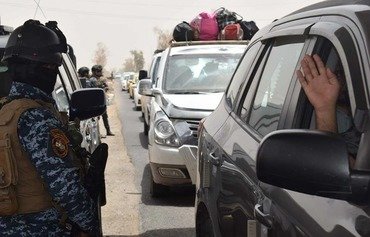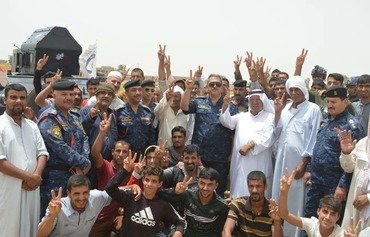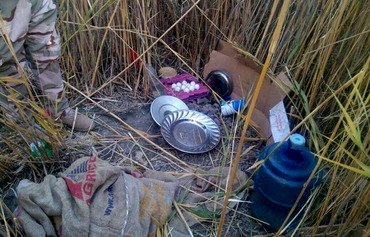"Islamic State of Iraq and Syria" (ISIS) remnants hiding out in the remote desert areas of Iraq are struggling to survive in the region's harsh environment, tribal leaders and local officials tell Diyaruna.
They face problems obtaining food, water and medical care, as local residents reject their presence in the areas they once terrorised.
In the western Kirkuk province town of al-Hawija, for example, there have been reports of desperate ISIS elements breaking into homes and shops to steal food.
ISIS remnants hiding in the wilderness "are living under extremely harsh conditions", said al-Hawija tribal forces commander Sheikh Wasfi al-Asi.
![An Iraqi police officer inspects equipment belonging to militants that he found stashed in western Kirkuk. [Photo courtesy of the Federal Police Command]](/cnmi_di/images/2018/06/14/12959-Iraq-Kirkuk-security-600_384.jpg)
An Iraqi police officer inspects equipment belonging to militants that he found stashed in western Kirkuk. [Photo courtesy of the Federal Police Command]
"They have nothing to eat and are going hungry," he told Diyaruna.
Raids met with strong resistance
Most of the ISIS foraging raids happen under the cover of darkness, al-Asi said, noting that they are "primarily met with strong resistance from locals".
ISIS remnants have been raiding remote villages and forcing residents to hand over food by threatening to kill them, he said.
They also have been known to "intercept travellers and farm trucks on main and dirt roads, robbing them of their possessions", he added.
In some cases, "accomplices and ill-spirited individuals" are secretly providing food and medicine to the group's remnants, he said, pointing out that these people might be relatives of the ISIS elements.
"Anyone proven to be providing any form of support to terrorist groups will be treated as a terrorist," he stressed, adding that security forces are working to identify any collaborators.
But these are isolated cases, al-Asi said, noting that there is a high level of co-operation among the local civilian population, the security forces and the tribes.
Locals provide vital intelligence
"Security forces are hunting down ISIS elements and can easily identify their hideouts, thanks to the information provided by locals," al-Asi said.
"We operate according to accurate intelligence, and we have wide coverage of the areas where the security operations take place, to the extent that phone calls are traced," he said.
"Ambushes and crackdowns are resulting in daily arrests," he added, noting that dozens of ISIS elements have been captured since the start of Ramadan.
These include senior leaders such as Abu Wahhab al-Iraqi, the ISIS official in charge of executions, who was captured with four accomplices in a high level intelligence operation on May 21st in al-Hawija's al-Zab district.
'Under siege' in Iraq's desert
ISIS remnants are facing a "debilitating siege" in Iraq's western desert, western Anbar tribal leader Sheikh Qatari al-Samarmad told Diyaruna.
"We have information that confirms they are in a deplorable state and suffer from hunger and disease," he said.
The military operations targeting ISIS remnants have forced them to stay in their hideouts for several days at a time without access to drinking water or food, al-Samarmad said.
"When they do get the chance to leave, their first objective is to look for helpless shepherds and steal their sheep or take their food and supplies," he added.
"The Anbar desert is vast, but it is no longer safe for members of ISIS," he added. "Their chances of survival are diminishing with every passing day."
No safe havens in Ninawa
Similarly, ISIS remnants who sought refuge in Ninawa's southern and western deserts are facing shortages of food and water as they cannot secure supplies in populated areas, said al-Qayyarah council chairman Mahmoud Abdul Rahman Tabour.
It becomes a suicide mission for them if they venture too close to the province's population centres, he told Diyaruna.
"There are no safe havens for them in our parts where they can find food supplies, and we have not seen cases where this is happening," he said, noting that ISIS elements taking cover in the desert are fighting for survival.
"They are fugitives and under siege in caves and hideouts, which have now become their graves," Tabour said.

![Iraqi forces capture a militant hiding in a rest house near the Diyala province town of Bahraz. [Photo courtesy of the Iraq Ministry of Defence]](/cnmi_di/images/2018/06/14/12958-Iraq-Diyala-Bahraz-600_384.jpg)






